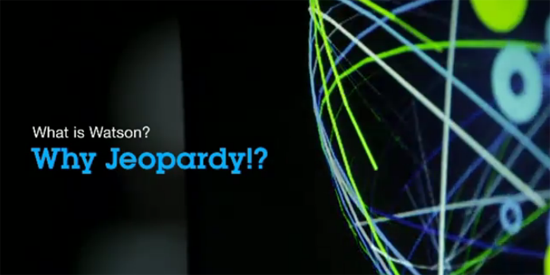Where to now, my Dear Watson?
by Andrew Boyd
Today, is it bigger than a bread box? The University of Houston's College of Engineering presents this series about the machines that make our civilization run, and the people whose ingenuity created them.
I first talked about Watson — IBM's game playing computer — before its national TV appearance on Jeopardy!. I was intrigued, but skeptical. Answering Jeopardy!questions was new and exciting territory for computer scientists. The logic is very different than adding columns of numbers or playing chess.

So I was happily surprised when Watson dominated the competition with the world's best players. Mind you, I'm a big fan of the human brain. It's capable of activities we have yet to fathom, much less replicate. But Watson's achievement demonstrates real progress in the field of artificial intelligence, a field that has yet to live up to its initial promise.
At a recent conference an IBM representative described how Watson 'thinks.' When a question is posed, hundreds of different algorithms kick into gear. Within seconds, they deliver their guesses to another algorithm that chooses the best. One audience member challenged the speaker. 'You used the word 'think' to describe what Watson does,' he said. 'That's not how I think.' 'Oh?' replied the man from IBM. 'Exactly how do you think?' We all laughed as we proceeded to think about how we think.
So what does Watson's success mean for IBM? For one thing, visibility. High profile activities generate business. But what kind of business? There's not a lot of demand for Jeopardy! playing computers.
One application the company's pursuing is medical diagnosis. Patients or their doctors describe symptoms, and Watson determines the most likely ailment. The idea's been around a long time. It's technically sound, but has so far met with limited success. We just don't seem ready to let computers give advice about our health.
Another application is phone support — providing answers when people call with questions. Companies have been trying this for years, but at the moment the experience is often frustrating. Callers encounter seemingly endless lists of options, eventually getting stuck and wanting help from a friendly voice. What if they could talk to Watson?

But to do that, Watson needs to learn one more skill: how to ask questions, not just answer them. If Watson's not sure it has the right answer, it can ask for more information, just like you or I would. The game's no longer Jeopardy!, it's twenty questions: can Watson figure out what we want by asking us twenty questions or less — hopefully, a lot less since we'll be doing our best to help Watson along.
It's not such a stretch. In fact, surprisingly good programs already exist for the game of twenty questions. You can find them on-line with your favorite search engine. If Watson ever gets the hang of it, we'll find ourselves in a brave new world.
I'm Andy Boyd at the University of Houston, where we're interested in the way inventive minds work.
(Theme music)
See the Wikipedia page about Watson.
The picture of the people at the call center is from the Brookhaven National Laboratory Web site http://www.bnl.gov/itd/helpdesk.